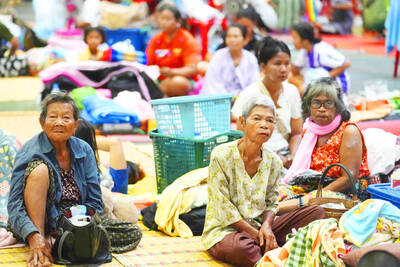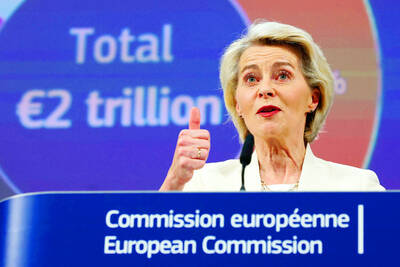Major powers will meet in London this week to discuss new sanctions on Iran amid a spat between Washington and the UN over Tehran's nuclear ambitions, US officials said on Tuesday.
The officials, who asked not to be named because they were not authorized to discuss the matter in public, said they expected the five permanent members of the UN Security Council plus Germany to meet toward the end of the week.
But Russian Foreign Minister Sergei Lavrov, visiting Tehran on Tuesday, suggested a unified approach was a way off, telling reporters "economic unilateral sanctions ... will not help the continued collective effort," an apparent reference to new US punitive measures announced last week.
Visiting Tehran two weeks ago, President Vladimir Putin also said Russia would not accept military strikes against Iran. Russia says dialogue is the way to ease tensions.
He also called on the Iranian leader to be "more active" in allaying the International Atomic Energy Agency's (IAEA) concerns over Tehran's controversial nuclear program.
Unilateral sanctions against Iran "are not helpful for the continuation of collective efforts" to resolve the dispute, Lavrov was quoted by Russia's Interfax news agency as saying.
Iranian President Mahmoud Ahmadinejad said in a speech on Tuesday that Iran would not retreat in the dispute and dismissed US offers of broader negotiations if Iran suspends its most sensitive atomic activities.
"This nation will not negotiate with anyone over its obvious and legal rights," he said. "... The Iranian nation does not need America."
This week's meeting of the P5+1 -- Britain, China, France, Russia, the US and Germany -- was to have taken place two weeks ago, but China pulled out after the US Congress honored the Dalai Lama.
Its purpose is to discuss a possible third UN Security Council resolution imposing sanctions against Iran for its refusal to suspend uranium enrichment. It was unclear whether the meeting would take place today or tomorrow.
The world's major powers agreed in late September to delay a vote on tougher sanctions on Iran until late this month at the earliest, depending on reports by the UN nuclear watchdog and an EU negotiator.
Russia and China opposed an early move to tighten economic sanctions, saying Tehran should be given more time to cooperate with IAEA to shed light on its past activities.
Agency chief Mohamed ElBaradei has annoyed Washington by suggesting its sometimes harsh stance toward Tehran was counter-productive. On Sunday, he urged Iran's critics to "stop spinning and hyping the Iranian issue."
Washington slapped new sanctions on Iran last week and recent months have seen somewhat belligerent rhetoric that has prompted speculation of possible US military action before US President George W. Bush steps down in January 2009.
Bush recently suggested that a nuclear-armed Iran could lead to World War III, but a White House spokeswoman said on Tuesday that was a "hypothetical situation" and the president was determined to resolve the standoff through diplomacy.
"There is no intention of bombing Iran," Dana Perino told reporters. "We are on a diplomatic track. We are working with our partners in the UN Security Council."

FOREST SITE: A rescue helicopter spotted the burning fuselage of the plane in a forested area, with rescue personnel saying they saw no evidence of survivors A passenger plane carrying nearly 50 people crashed yesterday in a remote spot in Russia’s far eastern region of Amur, with no immediate signs of survivors, authorities said. The aircraft, a twin-propeller Antonov-24 operated by Angara Airlines, was headed to the town of Tynda from the city of Blagoveshchensk when it disappeared from radar at about 1pm. A rescue helicopter later spotted the burning fuselage of the plane on a forested mountain slope about 16km from Tynda. Videos published by Russian investigators showed what appeared to be columns of smoke billowing from the wreckage of the plane in a dense, forested area. Rescuers in

Philippine President Ferdinand Marcos Jr is to meet US President Donald Trump this week, hoping Manila’s status as a key Asian ally would secure a more favorable trade deal before the deadline on Friday next week. Marcos would be the first Southeast Asian leader to meet Trump in his second term. Trump has already struck trade deals with two of Manila’s regional partners, Vietnam and Indonesia, driving tough bargains in trade talks even with close allies that Washington needs to keep onside in its strategic rivalry with China. “I expect our discussions to focus on security and defense, of course, but also

POINTING FINGERS: The two countries have accused each other of firing first, with Bangkok accusing Phnom Penh of targeting civilian infrastructure, including a hospital Thai acting Prime Minister Phumtham Wechayachai yesterday warned that cross-border clashes with Cambodia that have uprooted more than 130,000 people “could develop into war,” as the countries traded deadly strikes for a second day. A long-running border dispute erupted into intense fighting with jets, artillery, tanks and ground troops on Thursday, and the UN Security Council was set to hold an emergency meeting on the crisis yesterday. A steady thump of artillery strikes could be heard from the Cambodian side of the border, where the province of Oddar Meanchey reported that one civilian — a 70-year-old man — had been killed and

‘OPPORTUNITY TO ENGAGE’: Antonio Costa and Ursula von der Leyen are to meet Chinese President Xi Jinping to discuss EU-China relations and geopolitical challenges Top leaders from China and the EU are to hold a summit in Beijing this week, as the major economic powers seek to smooth over disputes ranging from trade to the Ukraine conflict. Beijing and Brussels have been gearing up to mark the 50th anniversary of the establishment of diplomatic ties, but a suite of squabbles over state subsidies, market access and wartime sanctions have dampened the festivities. A spokesperson for the Chinese Ministry of Foreign Affairs yesterday confirmed that European Council President Antonio Costa and European Commission President Ursula von der Leyen would visit on Thursday. The statement came after the EU